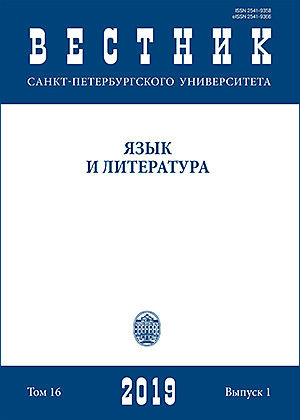The interaction the investigative and the science journalism for creation media texts
DOI:
https://doi.org/10.21638/spbu09.2019.105Abstract
Recently there has been a growing interest to scientific journalism of both researchers and the professional community in Russia but is practically not in demand by a wide audience. The development of specialized publications contributes to the renewal of the genre structure of scientific journalism, including through journalistic investigation. Science faces with some problems of fraud and pseudoopenings, the activities of individual scientists and institutions are at the center of scandals not directly related to science. These topics cause a public reaction and don’t require special preparation from the audience or the journalists themselves at the same time. The investigation in scientific journalism includes a comprehensive study of a particular research or scientific branch in order to competently present scientific results to the audience and to verify official information. In the first case, scientific problems attract the attention of professional journalists, in the second one professional scientists become authors, mostly bloggers. The principles of organizing the scientific community in the blogosphere affect the traditional media, inviting scientists to cooperate both as authors and as experts. The popular scientific newspaper “Troitsky variant — Science” is considered as an example. Such venues become a place for posing discussion issues, discussing pressing problems, and not only of a scientific nature. An example of the implementation of the investigative potential in the media materials is publications about the activities of the “Dissernet”, which is exposing fraud in science. At the same time, under the guise of a journalistic investigation on scientific topics, a wide audience is offered uncritical materials or are devoted to pseudoscientific questions. With the visible observance of genre requirements, we observe a substitution of concepts not only when the society assesses journalistic investigations, but also when evaluating scientific activity, when forming its own picture of the world.
Keywords:
science journalism, journalism investigation, science blogs, research orientation of scientific publications, political problems of science journalism
Downloads
References
Литература
Абрамов 2014 — Абрамов Р. Н. Профессионализация научной журналистики в России: сообщество, знание, медиа. Вестник Томского государственного университета. 2014, 1 (25): 111–123.
Brumfiel 2009 — Brumfiel G. Science journalism: Supplanting the old media? Nature. 2009, 458 (7236): 274–277.
References
Абрамов 2014 — Abramov R. N. [Professionalisation of science journalism in Russia: community, knowledge, media]. Vestnik Tomskogo gosudarstvennogo universiteta. 2014, 1 (25): 111–123. (In Russian)
Brumfiel 2009 — Brumfiel G. Science journalism: Supplanting the old media? Nature. 2009, 458 (7236): 274–277.
Downloads
Published
How to Cite
Issue
Section
License
Articles of "Vestnik of Saint Petersburg University. Language and Literature" are open access distributed under the terms of the License Agreement with Saint Petersburg State University, which permits to the authors unrestricted distribution and self-archiving free of charge.






